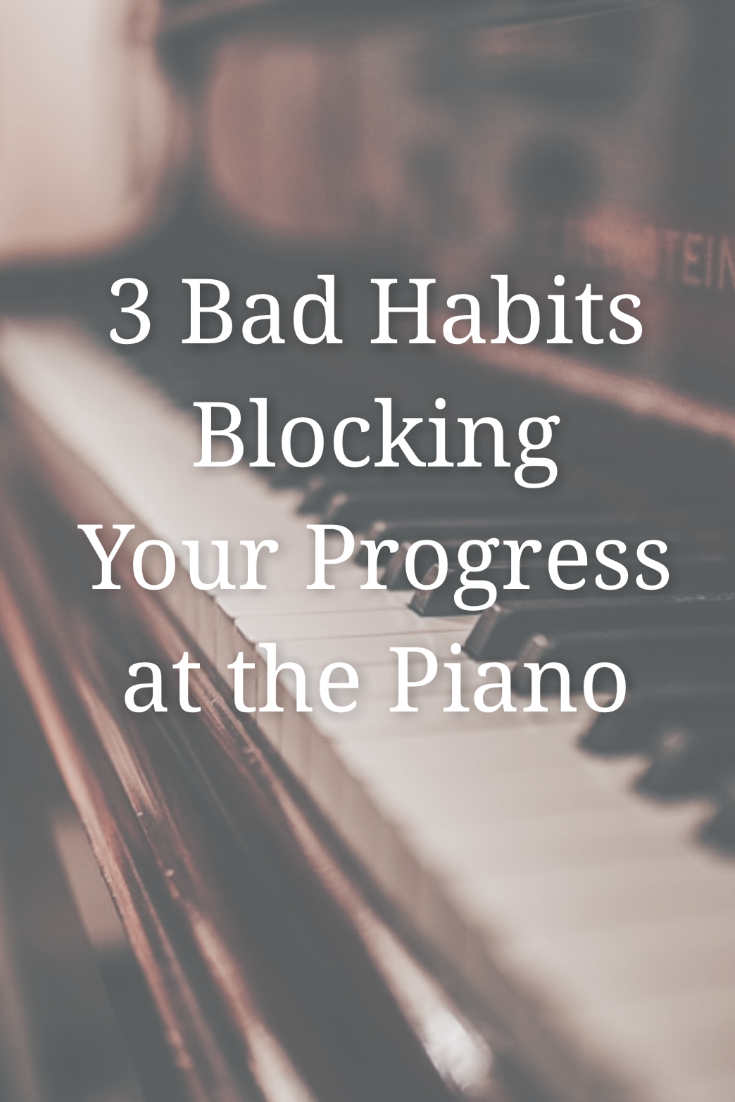3 Bad Habits Blocking Your Progress at the Piano
Are you practicing a lot, but not seeing the results you expect from your efforts? It’s possible that you have some bad habits holding back your progress. Practicing is all about quality over quantity. While it’s important to put in time regularly at the piano, it can actually do more harm than good if you’re practicing with bad habits. Read on to see some common practice issues that students experience at all levels!
Playing a piece from start to finish every time you practice.
Let’s say you’re in the initial stages of learning a piece that’s 2 pages long. You play to the end. How did it go? So many students will say “it went pretty well; I made a few mistakes,” then when I ask them what their next step is, they say “…play it again?”
There are 2 big problems with this approach. First of all, when we play a piece fully from beginning to end, our minds register that mistakes were made, but by the time we get to the end of the piece we almost never can remember both where and why we made all of those mistakes. This is a problem in itself, because we need to identify the cause of a problem to fix it. A lot of my job as a piano teacher is identifying why a student is making a mistake in a particular spot and coming up with a practice method that will undo that mistake. After playing all the way through in this way, my recommendation is to start again and as soon as a mistake is made, identify the cause, isolate the section, and play it correctly repeatedly to train your fingers to play accurately. More on that here. The next step is integrating that section back into the full phrase and doing some repetition there to solidify everything.
The even bigger problem is when we start over and play from beginning to end AGAIN without addressing any of the specific issues. Maybe we go ahead with playing it again, and we accurately play 3 out of 5 of the sections we played incorrectly the first time. First of all, that means you just reinforced 2 of those mistakes a second time, training your fingers to play those two parts wrong. Secondly, correcting an error one time is not enough to actually fix the mistake. It’s essential to use lots of accurate repetition to build muscle memory. We process this best in small pieces, gradually putting things back together until the piece sounds exactly like we want it to.
Playing too fast.
Here’s another common scenario during a piano lesson. The student shows me the new piece they’ve been working on, playing through the piece with multiple wrong notes, wrong rhythms, missed dynamics and articulations, at performance tempo. I explain that they’re playing too fast, and I model the tempo that they should be practicing at this point in the learning process. The student plays again and plays it way faster than my modeled practice tempo, maybe just a few bpm under the final tempo. Before we repeat the entire process of wrong notes, wrong rhythms, etc. I stop them. “It’s still too fast. Play it as slowly as you possibly can.” Then the student might roll their eyes and jokingly play it at a ridiculously slow tempo. But you see, this is what I wanted the entire time!
If we’re making multiple mistakes, we’re playing too fast. And guess what? Playing at a tempo that your fingers are not ready for is basically a complete waste of time. It’s one of the best ways to reinforce bad technique, wrong notes, and other errors that make us play messily and without control. Practice so slowly that you can’t even fathom playing a wrong note. Once this tempo is established, you can actually play it accurately and do some repetition. Before you know it, it will be easy for you to move up the tempo and you’ve actually saved yourself a ton of time by taking a few minutes to really learn the music at a slow tempo.
Cramming all of your practice into one day.
We’ve all done this, haven’t we?? It’s certainly better to practice 3 hours the day before your lesson than to practice nothing at all. And sometimes in life, our schedules get busy and cramming practice into one or two days is the only way we’ll even make it to the piano. I don’t think this is super harmful if it’s a once in a while event. The problem begins when we make cramming a weekly routine. The human brain needs time to process learning new skills, and if we try to do all of the work needed for the week in one sitting, it’s not as effective as doing a shorter amount at more frequent intervals during the week. Trust me, there’s all sorts of science-y stuff out there to prove this (here, here, to start). Basically, our brains are actually doing things when we give them time to rest. Creating a practice routine that fits into your schedule, whether you’re super busy or you have a ton of extra time, is a powerful and positive learning tool for playing the piano and learning other skills.
Do you need help making an effective practice routine? Check out this post for HELP!
Do you have any bad habits in your practice routine, or are you a perfect piano angel??
Want to learn piano with me? Sign up for updates on my digital course for beginners!
